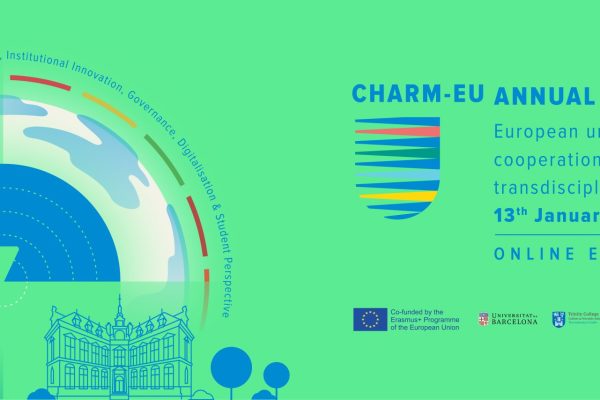On the 13th of January CHARM-EU organised its second international conference, titled ’European universities’ cooperation: towards sustainable, transdisciplinary partnerships’. The event was hosted by Utrecht University, with participants joining the sessions virtually from around the world.

With over 350 registries, the second annual conference of CHARM-EU was a huge success, where experts discussed how to strengthen the partnerships of European Universities in the EU. Furthermore, ideas of innovations and trends in the higher education sector were exchanged, which set the framework of the existing higher education landscape and allowed participants to gain insight into what the future of this field might look like.
The conference commenced with the welcome message of the Commissioner for Innovation, Research, Culture, Education, and Youth, Mariya Gabriel. In her speech she expressed:
The European Universities initiative is key to developing long-term institutional, structural and strategic transnational cooperation, based on common European values, to reinforce the quality, performance, attractiveness and international competitiveness of European higher education. Higher education institutions are definitely stronger together. This reinforced cooperation across Europe will empower a new generation of Europeans to work together, across borders, in different languages, and across sectors and disciplines.
Following Mariya Gabrielle’s welcoming words, Prof. Henk Kummeling, Rector of the event’s host institution, the University of Utrecht, welcomed the participants of the conference as well.
In the first session, innovation and trends were discussed in the higher education sector, with reflection on the present and future of this landscape. The second session introduced the different break-out sessions of the conference, which were designed to explore the relationship between European universities and current developments in the higher education sector.
Experts in the thematic break-out sessions of the conference provided a closer look into five intriguing areas of the European Universities initiative: education, institutional innovation, governance, digitalisation, and student perspective. With over a collective of 170 participants in the different break-out sessions, the discussions and presentations yielded fruitful and insightful results.
Finally, the last session of the conference looked to the future and discussed how education can and should be advanced in order to align with the current needs of sustainable development.
We would like to thank all of our experts, speakers, and participants for contributing to such a successful event!